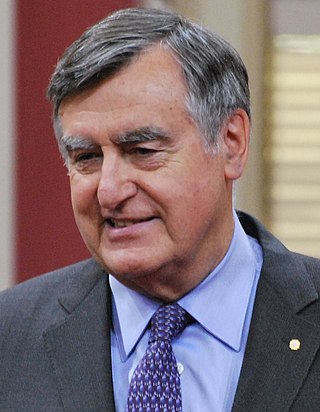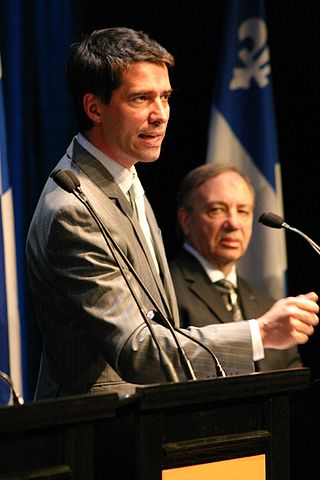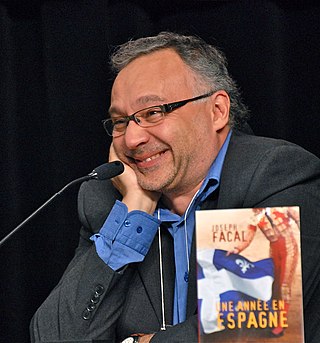Related Research Articles
The Parti Québécois is a sovereignist and social democratic provincial political party in Quebec, Canada. The PQ advocates national sovereignty for Quebec involving independence of the province of Quebec from Canada and establishing a sovereign state. The PQ has also promoted the possibility of maintaining a loose political and economic sovereignty-association between Quebec and Canada. The party traditionally has support from the labour movement; however, unlike most other social democratic parties, its ties with organized labour are informal. Members and supporters of the PQ are nicknamed péquistes, a French word derived from the pronunciation of the party's initials.

Lucien Bouchard is a French Canadian lawyer, diplomat and retired politician.

Bernard Landry was a Canadian politician who served as the 28th premier of Quebec from 2001 to 2003. A member of the Parti Québécois (PQ), he led the party from 2001 to 2005, also serving as the leader of the Opposition from 2003 to 2005.

André Boisclair is a former Canadian politician and convicted sex offender in Quebec, Canada. He was the leader of the Parti Québécois, a social democratic and sovereigntist party in Quebec.

Pauline Marois is a retired Canadian politician, who served as the 30th premier of Quebec from 2012 to 2014. Marois had been a member of the National Assembly in various ridings since 1981 as a member of the Parti Québécois (PQ), serving as party leader from 2007 to 2014. She is the first female premier of Quebec.
Louis Plamondon is a Canadian politician who served as the interim speaker of the House of Commons from September 27 to October 3, 2023. A member of the Bloc Québécois, he has represented Bécancour—Nicolet—Saurel since 1984. As the longest-serving current member of the House of Commons, Plamondon is Dean of the House, and holds the record as Canada's longest-serving dean.

François Legault is a Canadian politician serving as the 32nd premier of Quebec since 2018. A founding member of the Coalition Avenir Québec (CAQ), he has led the party since it began in 2011. Legault sits as a member of the National Assembly (MNA) for the Lanaudière region riding of L'Assomption. Legault's ongoing tenure of 6 years, 80 days, as premier is the ninth-longest in Quebec history.

Joseph Facal is a Canadian politician, academic, and journalist in the province of Quebec. He was a Parti Québécois member of the National Assembly of Quebec from 1994 to 2003 and was a cabinet minister in the governments of Lucien Bouchard and Bernard Landry.
Sylvain Simard is a politician and academic based in the Canadian province of Quebec. He represented Richelieu in the National Assembly of Quebec from 1994 to 2012, and was a cabinet minister in the governments of Lucien Bouchard and Bernard Landry. Simard is a member of the Parti Québécois (PQ).
Robert Perreault is a Canadian politician and administrator in the province of Quebec. He was a prominent city councillor in Montreal from 1982 to 1994, a Parti Québécois member of the National Assembly of Quebec from 1994 to 2000, and a cabinet minister in the government of Lucien Bouchard.
Jacques Léonard is a Canadian accountant, educator, and politician in the province of Quebec. He served in the National Assembly of Quebec from 1976 to 1985 and again from 1989 to 2001 and was a cabinet minister in the governments of René Lévesque, Jacques Parizeau, and Lucien Bouchard. Léonard is a Quebec sovereigntist and a member of the Parti Québécois (PQ) and Bloc Québécois (BQ).
Michel Létourneau was a Canadian politician in the province of Quebec. He served in the National Assembly of Quebec from 1994 to 2007 as a member of the Parti Québécois (PQ) and was a cabinet minister in the government of Bernard Landry.
Robert Benoit is a Canadian politician in the province of Quebec. He served in the National Assembly of Quebec from 1989 to 2003 as a member of the Quebec Liberal Party.
Guy Tardif was a Canadian politician. He was a Parti Québécois member of the National Assembly of Quebec from 1976 to 1985 and was a cabinet minister in the governments of René Lévesque and Pierre-Marc Johnson. He is the grandfather of professional gridiron football guard Laurent Duvernay-Tardif.
Denis de Belleval is a former politician and administrator in the Canadian province of Quebec. He was a Parti Québécois member of the National Assembly of Quebec from 1976 to 1982 and was a cabinet minister in the government of René Lévesque. He has also held several administrative positions, including a two-year tenure as the president of Via Rail.
Hélène Robert is a Canadian farmer, administrator and politician. Robert was a Parti Québécois member of the National Assembly of Quebec from 1994 to 2007.
Alain Marcoux is a Canadian administrator and former politician. Marcoux was a Parti Québécois member of the National Assembly of Quebec from 1976 to 1985 and was a cabinet minister in the governments of René Lévesque and Pierre-Marc Johnson. Marcoux is currently the director-general of Quebec City.
Ginette L'Heureux is an administrator and former politician in Montreal, Quebec, Canada. She was a member of the Montreal city council from 1986 to 1994, serving as a member of the Montreal Citizens' Movement (MCM) party.
Giuseppe Sciortino was an Italian-born Canadian lawyer and political activist in Quebec, Canada. He ran for both the National Assembly of Quebec and the House of Commons of Canada.
Pierre Bélanger is a Canadian lawyer and politician in the province of Quebec. Bélanger was a Parti Québécois (PQ) member of the National Assembly of Quebec from 1992 to 1998 and was a cabinet minister in the government of Lucien Bouchard.
References
- ↑ "BIOCHEM PHARMA INC.; APPOINTMENTS," Montreal Gazette, 8 October 1992, p. 3.
- ↑ "Hardliner quits PQ, others decide to stay until election," Montreal Gazette, 29 January 1985, p. 1; "Hardliners seek way to halt Johnson; Some in PQ think Garon can fill the bill," Montreal Gazette, 13 July 1985, p. 1.
- ↑ "Apple growers offer to pay pickers more," Montreal Gazette, 10 September 1986, p. 4.
- ↑ "Farmers say acid rain will kill maple industry," Montreal Gazette, 10 December 1987, p. 4; "Federal ministers shunning forum on acid rain," Montreal Gazette, 26 January 1988, p. 6; "Farmers fear period of instability if Oxdon acquires Steinberg," Montreal Gazette, 27 January 1988, p. 1.
- ↑ Harvey Shepherd, "Reduce food aid, organization urges," Montreal Gazette, 19 March 1988, p. 8.
- ↑ Richard Cleroux, "PM faces fight with Quebec farmers over free-trade deal," Globe and Mail, 30 August 1988, p. 8.
- ↑ Patricia Poirier, "Agriculture debate set," Globe and Mail, 25 October 1988, p. 10.
- ↑ Barry Wilson, "Farmers fear Tory embrace of free trade will kill them; Market boards that stabilize rural incomes are under fire," Montreal Gazette, 6 January 1990, p. 6.
- ↑ "Quebec Farmers Union pulls out of rezoning talks," Globe and Mail, 3 June 1989, p. 8; "Liberals freeze farmland rezoning pending report," Montreal Gazette, 17 June 1989, p. 7; "Developers have field day with farmland," Montreal Gazette, 17 June 1989, p. 1.
- ↑ Kate Dunn, "Transit cuts more severe than revealed: union; They claim there are 117 bus routes undergoing reductions in service," Montreal Gazette, 9 September 1991, p. 3.
- ↑ Mike King, "Union, transit authority take shots at each other as buses await repairs," Montreal Gazette, 15 January 1992, p. 3; Elizabeth Thompson, "Transit maintenance union postpones strike," Montreal Gazette, 2 March 1992, p. 3; Katherine Wilton, "Industrial park gets 5 new bus routes; MUCTC aims at 15,000 new customers in St. Laurent," Montreal Gazette, 19 March 1992, p. 5.
- ↑ "BIOCHEM PHARMA INC.; APPOINTMENTS," Montreal Gazette, 8 October 1992, p. 3; Suzanne McGee, "BioChem hires detective to find source of negative report," Montreal Gazette, 14 January 1993, p. 1.
- ↑ Ronald Lebel, "BioChem's AIDS drug to begin final trials," Montreal Gazette, 24 March 1993, p. 1; Michael McHugh, "AIDS sector iffy prospect for investors," Financial Post, 12 June 1993, p. 12; Kevin Dougherty, "Wellcome gets option for BioChem AIDS drug," Financial Post, 14 March 1994, p. 4.
- ↑ Linda Drouin, "Ottawa studies allegations vaccines are to be dumped; Bio- Vac complaint targets Connaught," Montreal Gazette, 26 March 1994, p. 3; Ann Gibbon, "Connaught denies vaccine claim Rival's charge that tender price amounts to dumping called misleading," Montreal Gazette, 29 March 1994, p. 6.
- ↑ Elizabeth Thompson, "City officials enjoy free lunch at mayor's speech," Montreal Gazette, 23 March 1994, p. 1.
- ↑ Philip Authier, "PQ begins planning perks for diplomats," Montreal Gazette, 12 May 1995, p. 8.
- ↑ Ann Gibbon, "Solidarite involvement proudly interventionist; Quebec Labour fund's investment goes beyond mere money," Globe and Mail, 18 March 1996, p. 1; Francois Shalom, "Tax `a hit' on credit unions, union funds: Government expects to reap $53 million over four years," Montreal Gazette, 11 May 1996, p. 3; Robert Gibbens, "Intrawest pulls out of $500M resort project in Quebec: Door isn't closed: Club Resorts turns back to original partner for deal," National Post, 10 November 1998, C3.
- ↑ Kathryn Leger, "Another Quebec agency joins call for Montreal Nasdaq: Meeting held: Exchange known to want international connections," National Post, 29 December 1999, C3; Edward Alden, "Quebec claws back some pride with Nasdaq deal: Montreal move embarrasses Toronto," Financial Times, 2 May 2000, p. 30.
- ↑ Michael Mainville, "Project not dead: backers: Awaiting port decision," Montreal Gazette, 3 June 2000, p. 3; Bertrand Marotte, "Montreal Port authority shuts out theme park," Globe and Mail, 15 June 2000, p. 6; Linda Gyulai, "Project for pier may still have life," Montreal Gazette, 20 June 2000, p. 1; Jeff Jedras, "The Mosel saga: the bid to lure chip maker Mosel Vitelic to Canada was an exercise in futility," SVN Canada, March 2001, p. 1.
- ↑ "The SGF: Four Years of Investment and Job Creation - $7.5 billion invested in four years, 43,000 jobs created" [press release], Canada NewsWire, 23 May 2002. See also "Report on development activities in 2002 - A positive year for Societe generale de financement du Quebec" [press release], Canada NewsWire, 27 December 2002.
- ↑ Don MacDonald, "5 years of throwing away our money" [editorial], Montreal Gazette, 19 December 2003, p. 1.
- ↑ "Gay games organizers land major sponsor: Financial backing removes hurdle," Montreal Gazette, 30 January 2004, p. 8; Canada NewsWire Daybook for Friday, September 3, 2004; Mike King, "Gay competitors prefer Outgames," Montreal Gazette, 12 October 2004, p. 7; Ann Carroll, "Flowers might help," Montreal Gazette, 21 January 2005, p. 5; James Mennie, "Others already looking at how we've done these games," Montreal Gazette, 22 July 2005, p. 6.